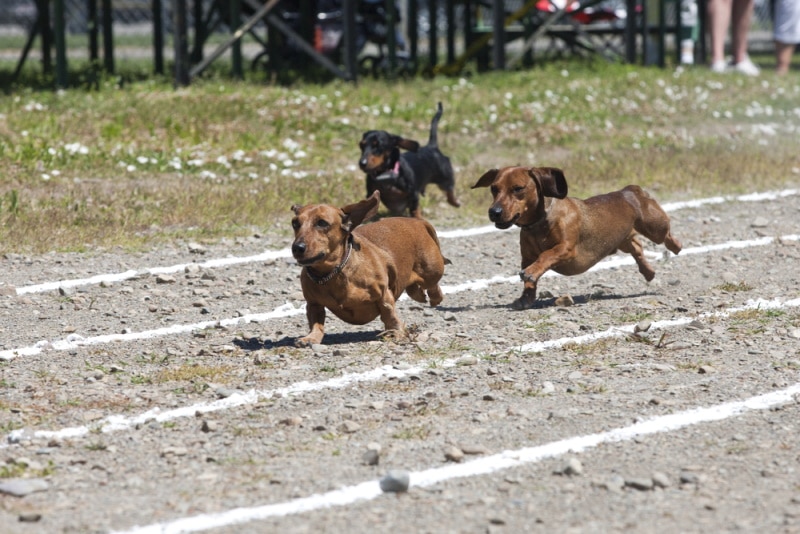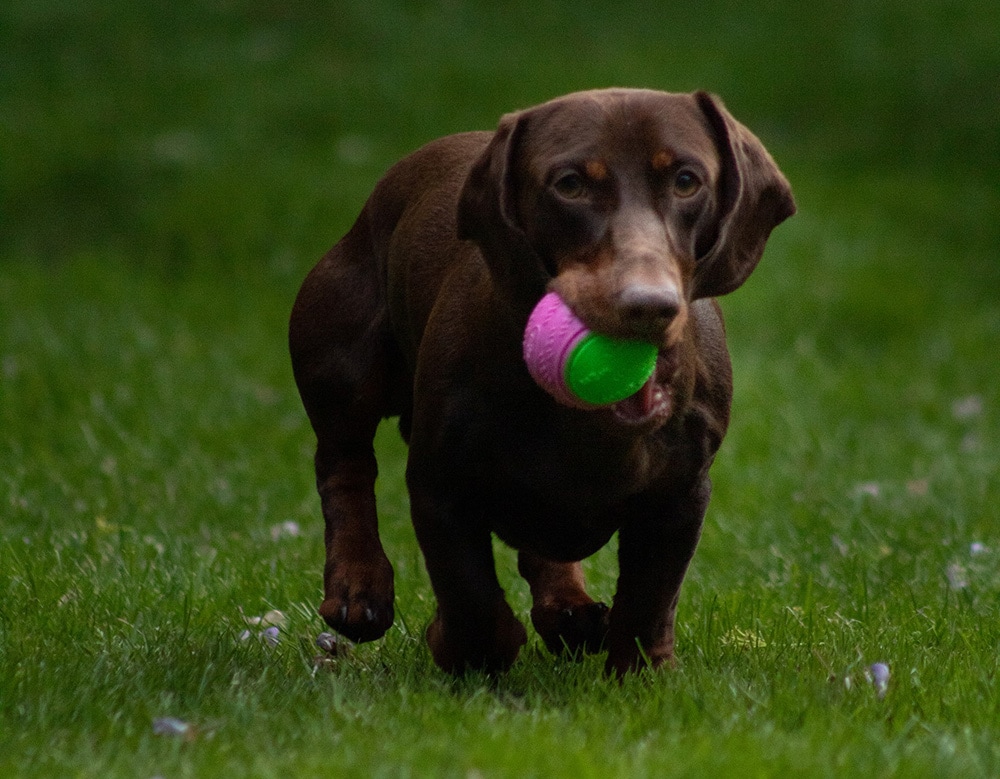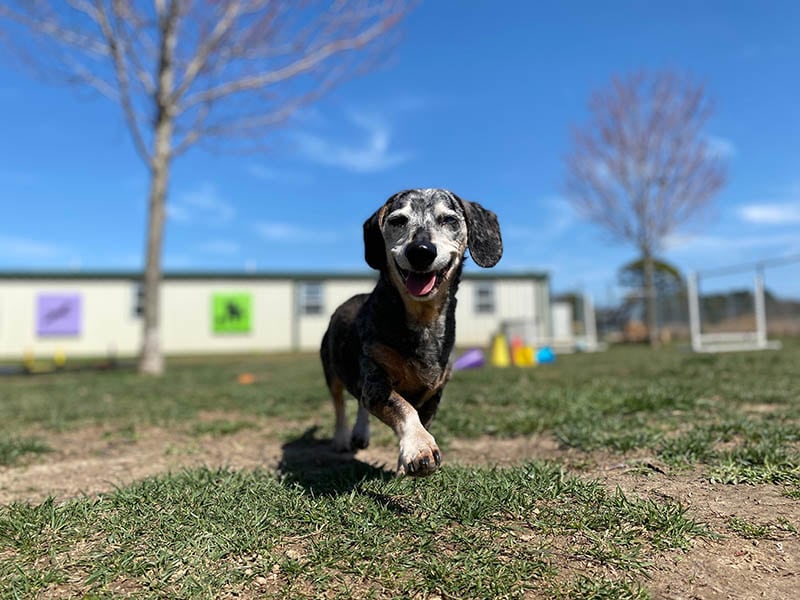
Dachshunds are short-legged, long-body dogs that love digging in the mud. Due to their tiny stature, many people naturally think these dogs won’t be quick. But surprisingly, Dachshunds are one of the toughest competitors on the racetracks because of their speed.
Dachshunds were initially bred to help their owners in hunting. This means these dogs can chase their prey for a very long time, but the question is: how fast do Dachshunds run? According to an estimation, Dachshunds can run reasonably fast at a top speed of 15-20 mph (miles per hour).1
This figure won’t be very impressive if you know the top speeds of other dog breeds. But considering Dachshunds’ short legs, this speed is actually relatively fast. Let’s discover how quick these dogs are and whether running suits their health.

The Top Speed of Dachshunds
Dachshunds are powerful dogs with a sturdy build, but this doesn’t mean they will run fast. Unfortunately, these dogs have shorter legs than their body size and weight, making it hard for them to reach maximum speeds. That is why they are one of the slowest dog breeds out there.
But regardless, Dachshunds love running. On average, an adult Dachshund with no severe health problems can reach the top speed of 15 to 20 mph or 31 kph. This speed is reasonably fast relative to a human, who typically runs at 6.5 to 8.5 mph.
Dachshunds also have a low endurance level, so they can only retain their top speed for a short time. This means these dogs run at high speed only in short bursts. So, you should never force your Dachshund to run fast for long.

The Speed of Dachshunds Compared to Other Breeds
The speed of Dachshunds is slower than other dog breeds, but to what extent? Let’s go through the speed of some popular dog breeds and see how they compare with Dachshunds.
The table above shows that Dachshunds are slower than large dog breeds. Yes, they might be more sluggish than other dogs, but they gave tough competition to humans. So, you should not underestimate your Dachshund’s speed, as these dogs can surprise you anytime.
Can You Take a Dachshund Out Running?
You can take your Dachshund out for running, as these dogs love going outside. But since these dogs have shorter legs, you should minimize their running time to keep them safe. Dachshunds are super energetic dogs with short bursts of energy. But they can only run up to high speeds for a short time.
If you want to go running with your Dachshund, take plenty of breaks to give your dog enough time to rest. This way, your pet won’t be tired and will run with you happily.
Remember, you should never force your Dachshund for long runs. Instead, keep them well-hydrated and make your experience fun. A Dachshund can even walk up to 3 miles or more in ideal conditions. In fact, many Dachshunds have reported walking up to 20 miles a day.
However, if you have a pup, you should limit its running or walking time. The best way to determine the ideal walking time for your pet is by adding 5 minutes to every month they grow. If your Dachshund is 7 months old, you should walk them for 35 minutes daily. As they become adults, you can take your pet for long walks until they feel tired.
One exciting thing about Dachshunds is that they can run sideways. This usually happens when these dogs have one dominant leg. They rely on that leg too much that it seems like they are running or walking sideways. Sometimes, they may also do side-stepping.
Sideways running is more common in growing pups. You can identify this behavior quickly since it is quite noticeable. Fortunately, there is nothing to worry about because this habit typically goes away as your Dachshund becomes an adult.

Can Running Harm Your Dachshund?
Like other dogs with long bodies, Dachshunds are susceptible to multiple health issues, especially their backs. In fact, 25% of this dog breed is at a higher risk of intervertebral disc disease (IVDD). Since such issues can be lethal for your dog, you should never take them lightly.
Intervertebral disc diseases impact your Dachshund the same as herniated discs. In this condition, the cushions present between the vertebral columns of your dog’s spines become ruptured. IVDD puts your dog in intense pain, which in turn, prevents them from carrying out their day-to-day activities.
You may also find your Dachshund moving with difficulty and immense pain. In worse situations, intervertebral disc diseases can lead your dog toward complete or partial paralysis.
Many factors can cause disc diseases in Dachshunds, but continuous pressure on the dog’s backbone remains at the top of the list. This means too much running can cause intervertebral disc diseases in your Dachshund.
Therefore, you should avoid overworking your dog and practice low-impact exercises that put minimal stress on the backbone.
You should avoid the following things with your Dachshund:
Always be attentive when your Dachshund is around people. Also, keep an eye on children who may try picking up your dog incorrectly.

How to Know When Your Dachshund Needs Rest
Every dog has a different level of stamina that allows them to run varying distances. So, the best way to determine when your Dachshund needs rest is by watching out for fatigue signs. If your dog pants excessively and sits down, know it’s time to stop running and return home.
Here are some signs that show your Dachshund doesn’t want to run anymore:
Young Dachshunds are better running partners than older ones since they are less susceptible to health issues. The key to keeping your dog safe during exercise or running is observing its behavior. When they look tired, stop going further. Instead, take a rest and continue after some time.
You must also vaccinate your puppy before taking them out for running. It will keep them healthy and add more years to their lifespan.

How to Keep Your Dachshund Fit for Running
Prevention is always better than cure. So, you must follow those methods that keep your Dachshund safe from contracting any severe health issue, such as IVDD. This is way better than taking your dog for surgery.
By implementing healthy changes in your pet’s daily life, you won’t only keep them fit for running but can also add a few years to their average lifespan. The best way is to consult a professional vet to determine the proper diet and exercise plan for your Dachshund.
Here are some tips to keep your Dachshund healthy for running:
If your Dachshund shows signs of fatigue or difficulty walking, they could have IVDD. So, take your pet to a vet as soon as possible if you suspect any unusual behavior in them. If your Dachshund has a history of health issues related to their back, mention it to your vet to determine the best treatment.
When taking your dog for a walk or run, always start slow and increase the duration over time. Doing so will build your Dachshund’s stamina and enable them to run for longer distances while being safe.

Conclusion
Dachshunds are compact, lively dogs with high energy levels. They love to walk and run outside, but unfortunately, they can’t do it for long. Since these dogs have shorter legs than their body weight and size, excessive running puts intense pressure on their back. This puts them at a high risk of IVDD and other spinal diseases.
Dachshunds can run pretty fast at 15 to 20 mph. However, they are more sluggish than other large dogs, including Poodles, Greyhounds, Rat Terriers, German Shepherds, and Siberian Huskies.
You can keep your dog fit for running by exercising regularly and including nutritious meals in their diet. Don’t forget to take your dog to a vet for regular check-ups!
Featured Image Credit: Andrea Wong, Shutterstock

